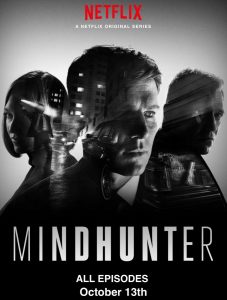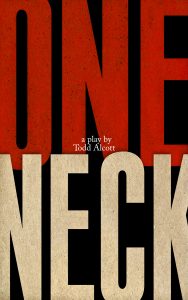Mindhunter vs One Neck
Watching the new Netflix show Mindhunter, I am reminded how the concept of “serial murder” was brand spanking new when I was a teenager, that killers like Ted Bundy, John Wayne Gacy, Jeffrey Dahmer and the rest were a terrifying new phenomenon to law-enforcement agencies, who had no vocabulary or protocol to deal with them. A novel like The Silence of the Lambs was capturing events that were still in the headlines, the FBI’s Behavioral Science Unit being a weird experimental new idea in an FBI where Dillinger-hunter J. Edgar Hoover’s death was still a fresh memory. Suddenly the FBI went from gangbusting to psychology, which required men like the protagonists of Mindhunter to travel around interviewing serial killers, to try to understand how their crimes were possible.
When I sat down to write the play One Neck, I read a whole stack of books on serial murder, and none — not one — came close to a clear explanation for their subject matter. For a researcher, the quest to understand involves trying to get inside the mind of a sociopath, which puts one in a very strange, very dangerous mental place (which the show Mindhunter explores to an extent). I can still remember trying to capture the voice of “my” killer, Lucian, writing for months in my room in Brooklyn, and how, in order to achieve his voice, I had to abandon every scrap of what I knew about morality. I would spend nights writing, hunched over my Royal portable typewriter, and then venture out in the morning to go to work and the world would seem like a very strange place.
That was just from reading those books and struggling to write that character, I can’t imagine what it was like for the FBI agents and psychologists who were actually in the room with those murderers.
There has been exactly one good movie about serial murder, one that captures what it’s like to struggle with a mind like that, and that’s David Fincher’s Zodiac (Fincher is a producer on Mindhunter, and directed the first two episodes). There is one great play about it, and that’s Lee Blessing’s Down the Road, which is about a “true-crime” writing couple who decide to take on the job of interviewing a serial killer for a book and how those interviews destroy their marriage. When I saw a reading of Down the Road in the early 90s, I said “That’s it. That’s what it’s like.”
My play One Neck isn’t about about that obsession or the (thankfully temporary) damage it did to my psyche. Rather it’s about what happens when a piece of chaos crashes a dinner party in Long Island, a party starring the peak of western civilization: a scientist, a stock broker, a TV news producer, a painter and a lawyer. While it’s almost been a movie a number of times, the play is deliberately anti-dramatic. The first act is a comedy of manners, the second act is pure existential horror. (As I liked to say in rehearsals, the first act is The Man Who Came to Dinner, the second act is Endgame). The narrative invites the audience in the same way the killer does, by being funny, weird, honest and discomforting. Then, when it’s got your interest piqued, it goes in for the kill.

